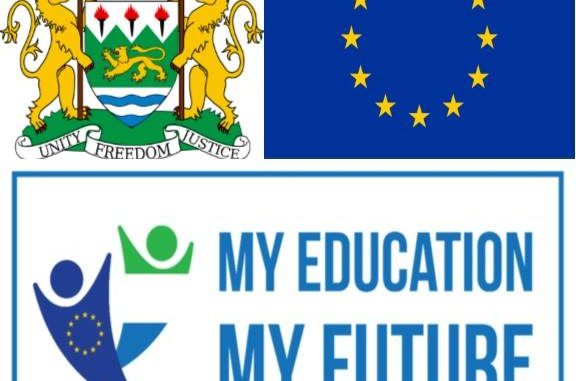
From the 2nd to the 24th March 2020, the Support to the Education Sector in Sierra Leone programme (SESSiL) hosted two external evaluators appointed by the European Union. SESSiL was launched in 2016 as part of a Financing Agreement between the European Union and the Sierra Leone government, to improve the quality of teaching and learning of children in the country. After three years of implementation, the evaluation team visited the country to conduct an independent assessment and evaluation of the intermediary results of the programme. Several key meetings with evaluators, Dr. Rogier Van’T Rood and Mr. Peter Merckx allowed for a deep understanding of the successes and challenges being encountered by technical partners and beneficiaries alike. The first series of meetings held in Freetown allowed for extensive discussions with personnel of the two Ministries of Education, the Teaching Service Commission, and experts in the Technical Assistance Team, PROMAN. The evaluators assessed, among other things, the quality and results of the varied activities undertaken by the programme. This was done within the context of fostering an evolving cooperation policy that emphasizes result-oriented approaches aimed at attaining Sustainable Development Goals 4, 5, and 8. The evaluators also had an opportunity to visit Port Loko, Makeni, Magburaka, and Bo, in the Northern and Southern Regions, where they met school leaders and teachers who had undergone intensive training courses on the National Professional Standards for School Leaders and Teachers in 2018 and 2019. In Sendugu, Port Loko District, Fatmata L Kamara, School Leader of the R.C. Primary School, demonstrated to the team how she had used training materials acquired through the courses to conduct a series of follow-up courses for teachers in her school. She spoke enthusiastically about how each of her teachers had accepted the idea of developing their professional portfolios, to track their progress in increasing and improving their professional competences. In Makeni, Head Master Suliman Tholley of the Al Harken Primary School spoke proudly of the various items his teachers had acquired in their portfolios. One portfolio contained a letter from a parent and another contained a Teacher’s Lesson Plan and a selfie with his/her students. The evaluators could clearly see that the investments made in the EU funded professional standards training programmes of August 2018, had been cascaded to the various districts, through a series of locally developed training workshops in various schools. Some headteachers said they had offered Saturday classes to nearby schools in an effort to train their teachers. At the R.C. Primary School, Masongbo, a rural community school, 5 miles from Makeni, Headmaster Sorie Thomas Sesay said he had trained 6 teachers in his school and over 20 teachers from 10 nearby schools. In all these schools, teachers were becoming more aware of the various competencies required of a professional teacher; developing their portfolios, and identifying where they had professional gaps in their training. In Makeni, Mr. Joseph I. Kargbo, the Teaching Service Commission District Director provided a picture of how these training programmes were beginning to make a difference. “Over the past few months, the TSC has continued to provide follow-up training programmes on the National Professional Standards. These training workshops have increased the level of interest of school leaders and teachers in many other districts.” Mr. Kargbo further observed that a major part of his tasks in the district was to alert teachers to the deadline of 31st December 2023, when all teachers in Sierra Leone will be expected to have gained the minimum level of New Teacher status. This is the first stage of professional growth on the teacher’s career path, as identified in the National Professional Standards. Failure to attain this level will result in a teacher being taken off the national payroll. “This information acts as an incentive for many teachers to take the professional standards seriously and opt for further training, in many cases, through Distance Teaching programmes offered by the various teacher training institutions”, Mr. Kargbo concluded. One of the continuing challenges being faced in many of the rural schools visited was the limited number of trained and qualified teachers. In one school, four of the seven teachers were untrained and unqualified. They had however been serving the community for more than 12 years. For many such teachers, understanding the competences of professional standards is the first step into a new world of professional training.

Leave a Reply